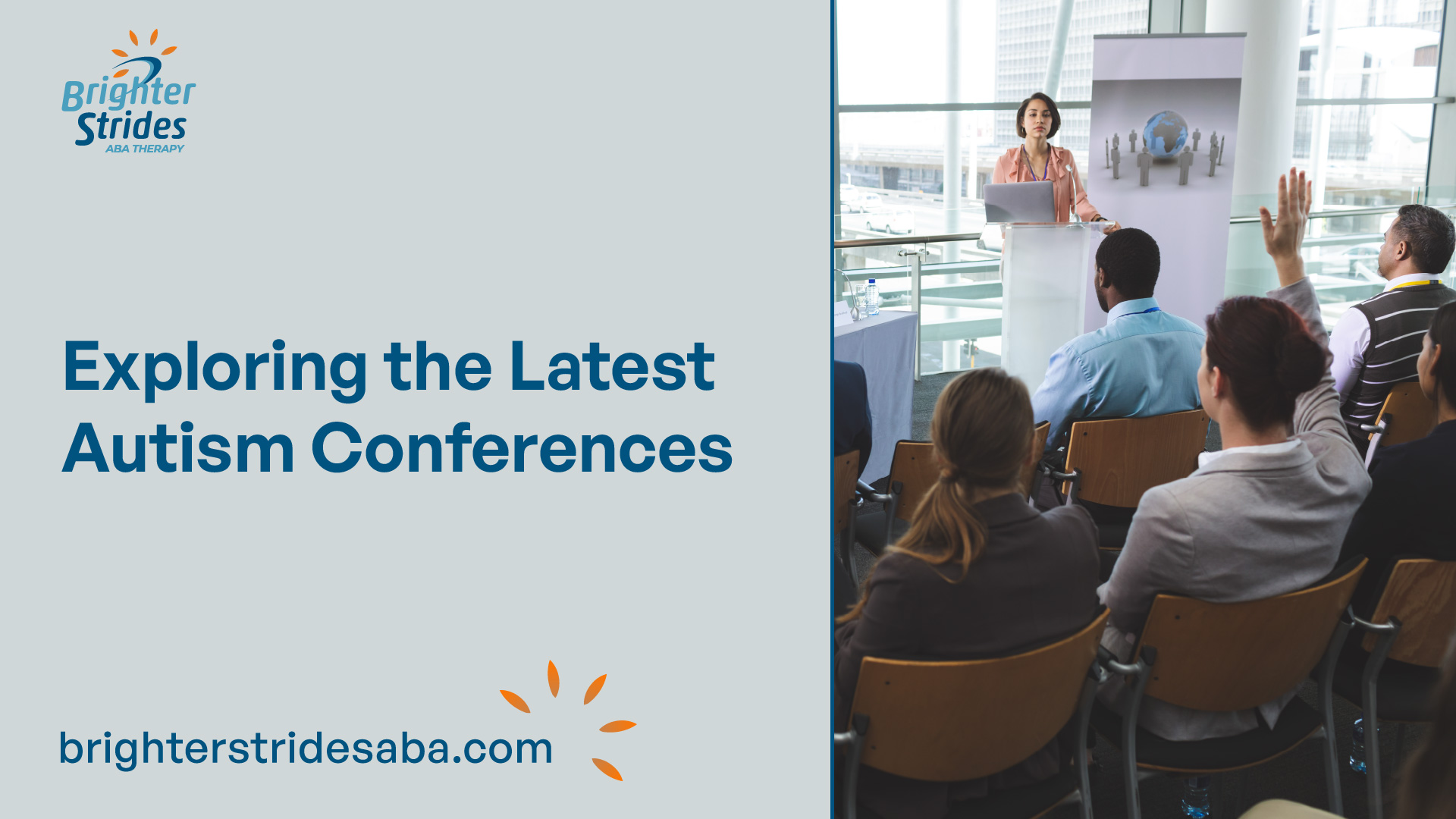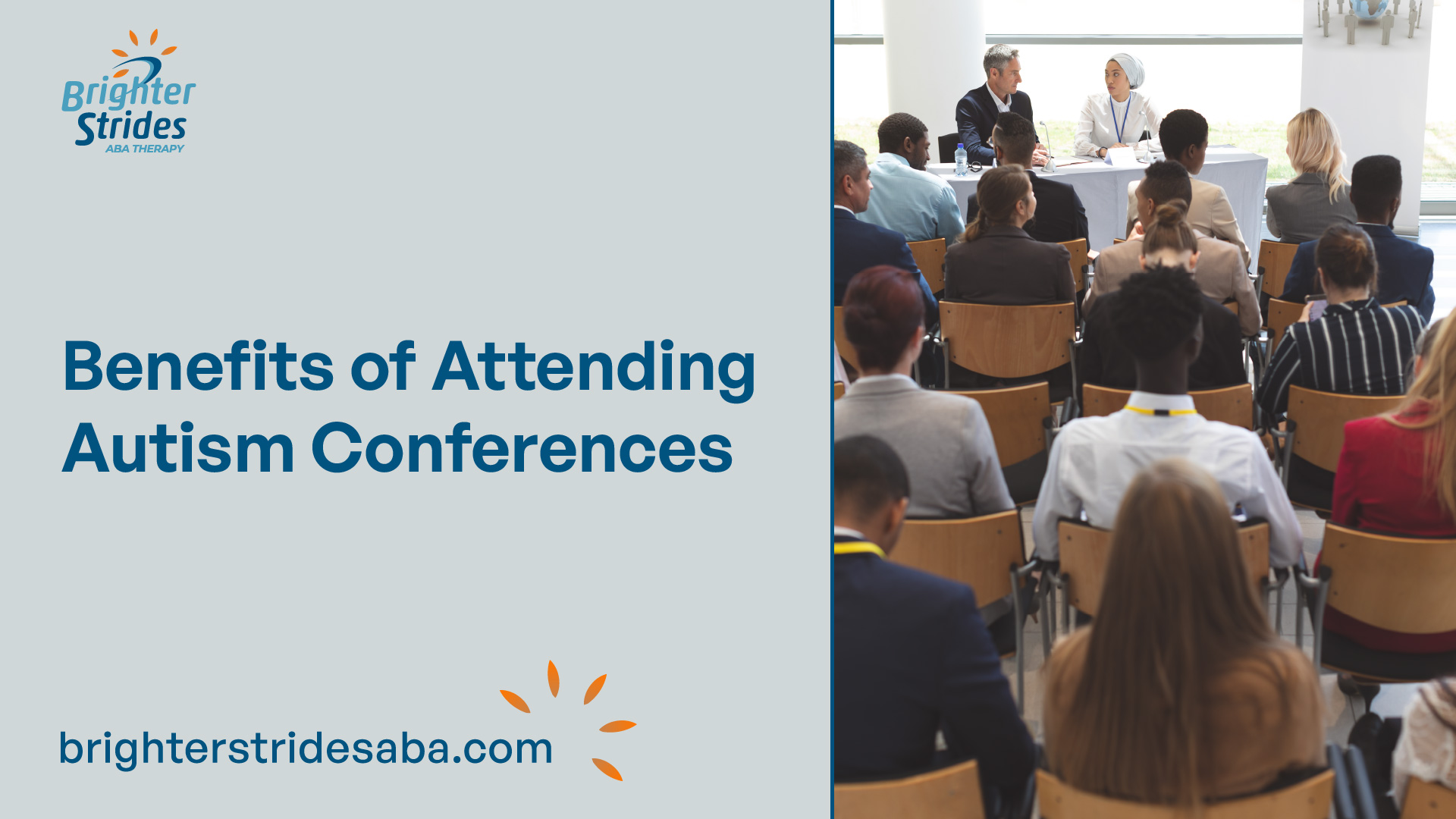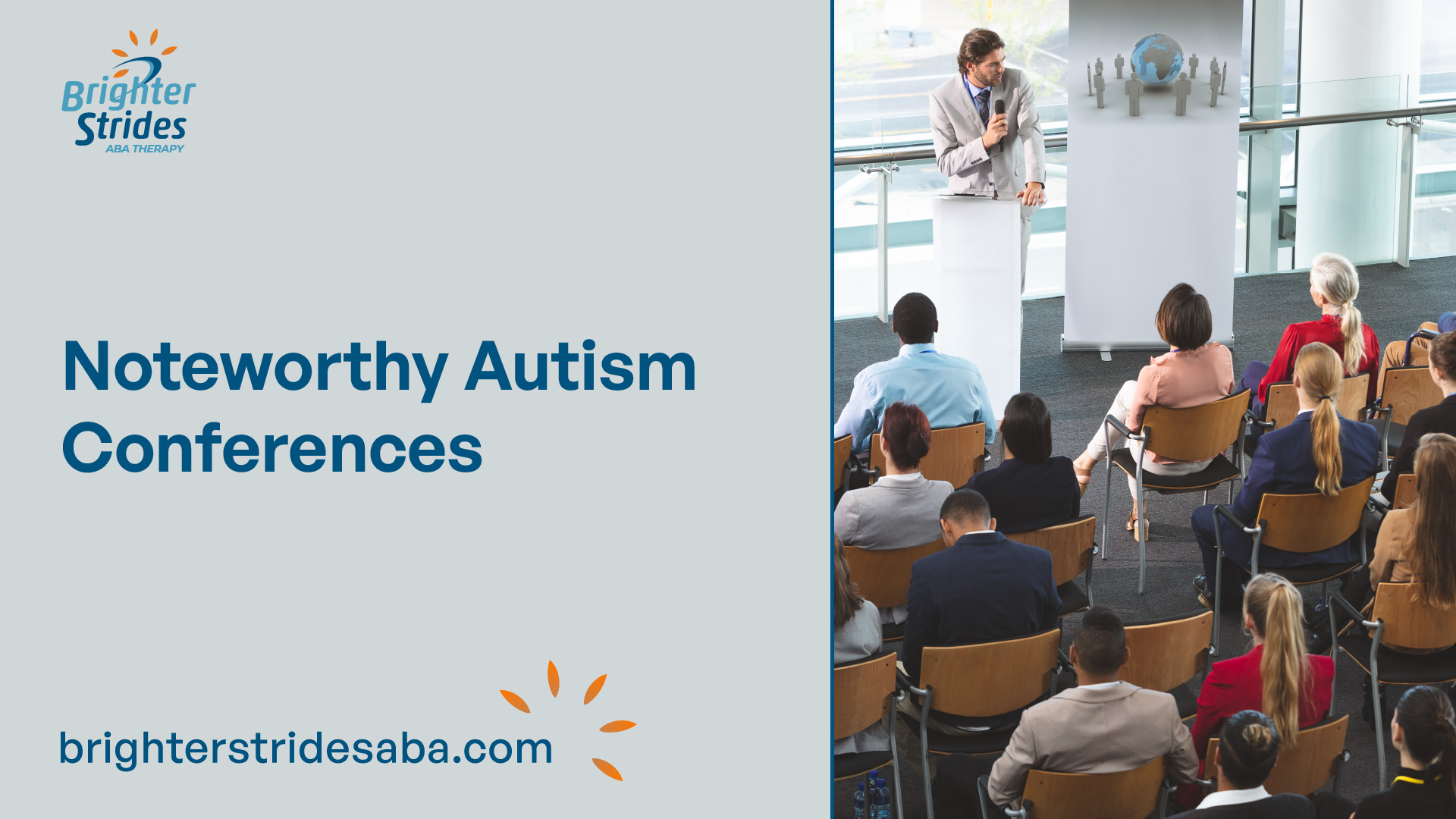Autism Conferences: A Comprehensive Guide
Autism conferences play a vital role in bringing together experts, professionals, and families affected by autism to share knowledge, exchange experiences, and explore the latest advancements in the field of autism spectrum disorder (ASD). These conferences provide a platform for learning, networking, and fostering a sense of community. Understanding the importance of autism conferences and the benefits they offer is key to staying informed and connected within the autism community.

The Importance of Autism Conferences
Autism conferences, such as the Autism Society National Conference, the International Meeting for Autism Research (IMFAR), and the Autism Education Summit, are significant events that bring together individuals from various backgrounds to discuss the challenges and advancements in understanding and supporting autism. These conferences serve as a catalyst for progress, providing opportunities for professionals, researchers, educators, and families to come together and collaborate.
By attending autism conferences, professionals in the autism field can stay up to date with the latest research, therapies, and interventions. These conferences serve as a platform for sharing knowledge, evidence-based practices, and emerging trends, enhancing professionals’ understanding of ASD. The exchange of ideas and experiences helps professionals expand their expertise and improve the quality of care they provide.
Furthermore, attending conferences fosters a sense of community among individuals touched by autism. It allows for the exchange of experiences, challenges, and successes, reducing feelings of isolation. Individuals attending these conferences can connect with others who share similar experiences and gain support from a network of individuals who understand the unique journey of autism.
Benefits of Attending Autism Conferences
There are numerous benefits to attending autism conferences. These conferences provide a platform for professionals, researchers, and advocates to come together and delve into key themes such as research and scientific advances, therapeutic approaches and interventions, and advocacy and policy initiatives. By attending these conferences, participants can:

- Stay Informed: Autism conferences offer a wealth of information on the latest research, treatments, and strategies. By attending presentations, workshops, and panel discussions, participants can gain insights into the most recent advancements in the field of autism.
- Network and Collaborate: Conferences provide a unique opportunity to build relationships, form collaborations, and create networks that extend beyond the conference itself. These connections can lead to ongoing support, mentorship, and partnerships, positively impacting the lives of individuals with autism.
- Share Experiences and Expertise: Presenting research findings, case studies, or personal experiences at conferences allows individuals to contribute to the collective knowledge of the autism community. Sharing expertise and experiences can inspire others and contribute to the overall understanding of autism.
- Professional Development: Attending conferences can contribute to professional development by earning continuing education credits, staying up to date with industry trends, and expanding knowledge in specialized areas of interest.
- Awareness and Advocacy: Autism conferences provide a platform to raise awareness about autism and advocate for improved services, support, and policies for individuals on the autism spectrum and their families. They offer opportunities to influence decision-makers and drive positive change.
Autism conferences offer a comprehensive guide to the latest research, therapies, and strategies for supporting individuals with autism. These events foster collaboration, knowledge sharing, and community building, making them essential for anyone involved in the autism community. By attending autism conferences, individuals can stay informed, network with like-minded professionals, and contribute to the advancement of autism understanding and support.
Noteworthy Autism Conferences
Attending autism conferences is a valuable opportunity for individuals interested in autism and related disorders to gather knowledge, connect with experts, and stay up-to-date with the latest research and advancements in the field. Here are some noteworthy conferences that focus on autism:

The Autism Society National Conference
The Autism Society National Conference is one of the largest conferences in the United States dedicated to autism and related disorders. It brings together parents, educators, researchers, and professionals from across the country to share ideas, experiences, and resources. This conference serves as a platform for networking, learning about innovative strategies, and connecting with others in the autism community.
The International Meeting for Autism Research (IMFAR)
The International Meeting for Autism Research (IMFAR) is an annual conference that gathers researchers and scientists from around the world to share the latest research findings on autism spectrum disorders. IMFAR covers a wide range of topics, including genetics, brain development, early intervention strategies, and more. This conference plays a crucial role in advancing the understanding of autism and fostering collaborations among professionals in the field.
The Autism Education Summit
The Autism Education Summit is specifically designed for education professionals who are passionate about supporting individuals with autism. This conference provides attendees with tools and strategies to enhance their understanding and effectiveness in educating individuals on the autism spectrum. Keynote speakers, workshops, and breakout sessions led by experts in autism education are featured, allowing participants to gain valuable insights and practical knowledge.
The National Autism Conference
The National Autism Conference is an annual event that attracts educators, therapists, and other professionals working with individuals on the autism spectrum. The conference offers a wide range of presentations and workshops covering topics such as behavior management, communication strategies, social skills development, and more. Attendees have the opportunity to learn from experienced professionals and gain valuable resources to support their work in the field of autism.
The Association for Behavior Analysis International Annual Convention
The Association for Behavior Analysis International Annual Convention brings together professionals, researchers, and educators passionate about autism education. The convention offers sessions and workshops led by knowledgeable speakers specializing in autism education. Topics covered include evidence-based interventions, inclusive classroom practices, behavior management strategies, and more. This convention provides a platform for sharing research, discussing best practices, and promoting collaboration among professionals in the field.
Profectum Conferences
Profectum holds various conferences throughout the year all over the country, committed to gathering cutting-edge practices in autism, teaching families how to use them with each unique child, and building a community of families affected by autism [2]. These conferences provide a platform for families, caregivers, and professionals to come together, exchange knowledge, and learn about the latest advancements in autism treatment and support.
The Love & Autism Conference
The Love & Autism Conference, hosted by Love & Autism organization, is a unique conference that incorporates musical and art presentations performed by individuals with autism. This conference aims to celebrate the talents and abilities of individuals on the autism spectrum while providing a space for discussion and learning. Attendees have the opportunity to gain insights from experts, engage in interactive sessions, and connect with a supportive community.
Attending these autism conferences can be a transformative experience, offering valuable information, networking opportunities, and support for individuals with autism, their families, and professionals in the field.
Finding and Participating in Autism Conferences
Attending autism conferences is a valuable opportunity for individuals, professionals, and families affected by autism to come together and stay informed about the latest research, treatment options, and strategies to improve the lives of those with autism. These conferences provide a platform for learning, networking, and fostering a sense of community among individuals touched by autism. In this section, we will explore how to find autism conferences, tips for making the most of these conferences, and the emergence of virtual autism conferences.
How to Find Autism Conferences
Finding autism conferences can be done through various channels to ensure individuals can access relevant events. Here are some ways to discover upcoming autism conferences:
- Online Research: Conducting a simple online search using keywords like “autism conferences” can yield a comprehensive list of upcoming events. Websites, forums, and social media platforms dedicated to autism awareness and support often share information about upcoming conferences.
- Professional Organizations: Professional organizations such as the Autism Society, Association for Behavior Analysis International, and National Autistic Society frequently organize and promote autism conferences. Checking their websites or subscribing to their newsletters can provide information on upcoming conferences.
- Local Support Groups: Local autism support groups or organizations in your area may organize or be aware of regional or community-based autism conferences. Reach out to these groups for information on upcoming events.
- Colleague Recommendations: Engaging with colleagues or professionals in the autism field can provide insights into conferences they have attended or upcoming events they recommend.
Tips for Making the Most of Autism Conferences
Attending autism conferences can be an enriching experience. Here are some tips to make the most of your conference participation:
- Plan Ahead: Review the conference schedule, keynote speakers, and breakout sessions in advance. Identify the sessions that align with your interests or professional goals and plan your itinerary accordingly.
- Engage and Network: Take advantage of networking opportunities to connect with experts, researchers, and other attendees. Engaging in conversations and sharing experiences can foster collaboration and support.
- Ask Questions: During Q&A sessions or panel discussions, don’t hesitate to ask questions and seek clarification on topics that interest you. This can enhance your understanding and encourage dialogue.
- Take Notes: Bring a notepad or use a note-taking app to jot down important insights, key takeaways, and contact information of individuals you meet. These notes will serve as valuable references after the conference.
- Visit Exhibits and Posters: Explore the exhibition area and poster presentations to learn about new products, services, and research findings. Interacting with exhibitors and presenters can provide additional insights and opportunities for collaboration.
Virtual Autism Conferences
In recent times, virtual autism conferences have gained popularity due to their accessibility and convenience. These conferences allow participants from around the world to attend sessions, interact with speakers, and access resources from the comfort of their own homes. Virtual conferences also eliminate travel costs and time constraints, making them more inclusive for individuals who may face challenges attending in-person events.
When participating in a virtual autism conference, ensure you have a stable internet connection, test your audio and video settings beforehand, and create a quiet and distraction-free environment. Engage in virtual networking opportunities, participate in live chats or discussion forums, and make use of any provided virtual conference platforms to connect with speakers and fellow attendees.
By utilizing these strategies and embracing the opportunities presented by virtual conferences, individuals can stay informed, connect with others in the autism community, and contribute to the advancement of autism awareness, research, and support.
Attending and participating in autism conferences provides a wealth of knowledge, networking opportunities, and support, making them a valuable platform for individuals, professionals, and families affected by autism.
The Impact of Autism Research
Research plays a crucial role in deepening our understanding of Autism Spectrum Disorder (ASD) and its impact on individuals and their families. Through ongoing studies and advancements, researchers have made significant contributions to the field of autism. In this section, we will explore the role of research in understanding autism, advances in autism research, and the importance of supporting further research efforts.
The Role of Research in Understanding Autism
Research on autism is vital for unraveling the complex nature of the disorder. It helps identify the causes and risk factors associated with ASD, including genetic and environmental factors that may contribute to its development. By studying these factors, researchers aim to uncover insights that can inform early detection, intervention, and prevention strategies.
Additionally, research on autism aims to advance our knowledge of the cognitive, social, and behavioral aspects of the disorder. Through various scientific methods and approaches, researchers explore the differences in brain structure and function, communication patterns, and social interactions among individuals with autism. These findings contribute to a deeper understanding of the diverse characteristics and challenges faced by individuals on the autism spectrum.
Advances in Autism Research
The field of autism research has witnessed significant advancements over the years. Researchers have made notable progress in identifying effective interventions and treatment options to help individuals manage their symptoms and improve their quality of life. While there is currently no known cure for autism, research has led to the development of evidence-based approaches that address various aspects of the disorder.
Advances in genetics research have shed light on the genetic basis of autism, highlighting specific genes and genetic variations associated with the disorder. This knowledge contributes to a better understanding of the underlying biological mechanisms and offers potential avenues for targeted interventions and personalized treatments.
Furthermore, research has expanded our understanding of the diverse range of strengths and challenges experienced by individuals with autism. This knowledge has paved the way for the development of specialized educational programs, therapies, and support services tailored to the unique needs of individuals on the autism spectrum.
The Importance of Supporting Autism Research
Supporting autism research is of paramount importance for several reasons. First and foremost, research plays a crucial role in reducing stigma and promoting the acceptance of individuals with autism. Through increasing public awareness and understanding of the disorder, research helps foster a more inclusive society. By dispelling misconceptions and stereotypes, research contributes to an environment that embraces and supports individuals with autism.
Moreover, autism research informs policy decisions and funding priorities. It provides valuable insights that assist government agencies, research institutions, and advocacy groups in determining directions for autism-related policies, funding allocations, and resource distribution. This support is essential for driving further advancements in the field and ensuring that individuals with autism have access to the necessary resources and support systems.
In conclusion, the impact of autism research is vast and multifaceted. It contributes to advancing our understanding of the disorder, identifying effective interventions, reducing stigma, enhancing public awareness, and promoting acceptance and inclusion in society. By supporting ongoing research efforts, we can continue to improve the lives of individuals with autism and their families, fostering a more inclusive and supportive world for all.
The National Autistic Society’s Annual Professionals Conference
The National Autistic Society’s Annual Professionals Conference is a highly anticipated event for professionals seeking to enhance their understanding of autism and improve their practice. This conference serves as a platform for attendees to stay updated on the latest evidence-based research and best practices, exchange ideas, and network with other professionals in the field.
Highlights of the Professionals Conference
The Professionals Conference organized by the National Autistic Society offers a range of highlights that attract professionals from various disciplines. Some of the notable highlights include:
- Cutting-edge Research: The conference focuses on highlighting the most recent research and insights in the field of autism. By featuring leading experts and researchers, attendees have the opportunity to gain knowledge about the latest developments and evidence-based practices.
- Diverse Program: The event offers a diverse range of presentations, workshops, and discussions that cover various topics related to autism. This enables attendees to select sessions that align with their specific interests and learning objectives, ensuring a personalized and enriching conference experience.
- Networking Opportunities: The conference provides an ideal environment for professionals to connect and network with like-minded individuals from various sectors. Attendees can engage in meaningful conversations, share experiences, and establish valuable professional connections.
Key Topics Covered at the Conference
The National Autistic Society’s Professionals Conference covers a wide range of topics related to autism, ensuring that attendees gain insights into the most pertinent issues in the field. Some of the key topics covered in the conference include:
- Autism diagnosis and assessment methods
- Effective strategies for supporting autistic individuals in educational settings
- Mental health and well-being of autistic individuals
- Communication and social interaction challenges in autism
- Transition planning and support for autistic individuals across different life stages
- Sensory processing and interventions for sensory sensitivities
- Employment and vocational support for autistic adults
The conference program includes expert-led presentations, interactive workshops, and panel discussions that delve into these topics, providing attendees with practical strategies and tools to enhance their professional practice.
Autism Professionals Awards
As part of the National Autistic Society’s annual Professionals Conference, the prestigious Autism Professionals Awards ceremony is held to recognize and celebrate individuals, teams, and organizations that have made significant contributions to the field of autism. These awards acknowledge outstanding achievements and innovative approaches that have positively impacted the lives of autistic individuals and their families.
The Autism Professionals Awards cover various categories, including Best Autism Research, Outstanding Health Professional, Inspirational Education Provision, and Outstanding Achievement by an Individual on the Autism Spectrum. This recognition not only highlights exemplary work but also inspires professionals to continue pushing boundaries and striving for excellence in their respective roles.
The National Autistic Society’s Annual Professionals Conference provides a valuable platform for professionals working in the field of autism to expand their knowledge, share expertise, and celebrate achievements. By attending this conference, professionals can stay at the forefront of the latest developments, connect with peers, and contribute to the advancement of best practices in supporting autistic individuals.
Noteworthy Autism Conferences
When it comes to staying informed and connected within the autism community, attending autism conferences can be immensely beneficial. These conferences serve as platforms for sharing knowledge, discussing the latest research, exploring treatment options, and fostering a sense of community among individuals touched by autism. Here are some notable autism conferences that attract professionals, researchers, educators, and families from around the world:
The Autism Society National Conference
The Autism Society National Conference is one of the largest conferences in the United States dedicated to autism and related disorders. It brings together parents, educators, researchers, and professionals from across the country to share ideas and connect with others in the autism community. This conference offers a diverse range of sessions and workshops covering various topics related to autism spectrum disorder (ASD).
The International Meeting for Autism Research (IMFAR)
The International Meeting for Autism Research (IMFAR) is an annual conference that gathers researchers and scientists from around the world to share the latest research findings on autism spectrum disorders. IMFAR covers a wide range of topics, including genetics, brain development, early intervention strategies, and treatment approaches. This conference provides a unique opportunity for researchers to exchange ideas and collaborate on cutting-edge research in the field of autism.
The Autism Education Summit
The Autism Education Summit is a conference dedicated to providing education professionals with the tools and strategies needed to support individuals with autism effectively. This conference features keynote speakers, workshops, and breakout sessions led by experts in the field of autism education. Attendees can gain valuable insights into evidence-based practices, behavior management techniques, communication strategies, and other important aspects of autism education.
The National Autism Conference
The National Autism Conference is an annual event that brings together educators, therapists, and other professionals working with individuals on the autism spectrum. This conference offers presentations and workshops on a wide range of topics, including behavior management, communication strategies, social skills development, and innovative approaches to supporting individuals with autism. Participants have the opportunity to learn from experienced professionals and network with like-minded individuals.
The Association for Behavior Analysis International Annual Convention
The Association for Behavior Analysis International Annual Convention is a conference that caters to professionals, researchers, and educators passionate about autism education. It provides sessions and workshops led by knowledgeable speakers who specialize in autism education. The convention covers topics such as evidence-based interventions, inclusive classroom practices, behavior analysis research, and advancements in the field of autism education.
Profectum Conferences
Profectum Conferences are renowned for their focus on developmental approaches and therapies for individuals with autism. These conferences bring together experts, practitioners, and parents to explore innovative treatments, strategies, and interventions that promote developmental progress in individuals with autism.
The Love & Autism Conference
The Love & Autism Conference offers a unique perspective on autism by emphasizing the importance of love and acceptance in the lives of individuals with autism. The conference features renowned speakers, interactive workshops, and panel discussions that explore various aspects of autism, including relationships, sexuality, and self-advocacy.
Attending these autism conferences provides individuals with the opportunity to gain knowledge, exchange experiences, and build networks within the autism community. By staying informed about the latest research findings, therapeutic approaches, and interventions, professionals and families can enhance their understanding of autism and improve the lives of individuals with autism spectrum disorder.
References
- https://www.supportivecareaba.com/aba-therapy/autism-conferences/
- https://lighthouseautismcenter.com/blog/top-autism-conferences-for-parents/
- https://www.linkedin.com/pulse/importance-research-autism-advancing-understanding-riback-hofmann
- https://www.autism.org.uk/what-we-do/autism-training-and-best-practice/conferences/annual-professionals-conference

 We've just released an article! Check out our blog!
We've just released an article! Check out our blog! 


